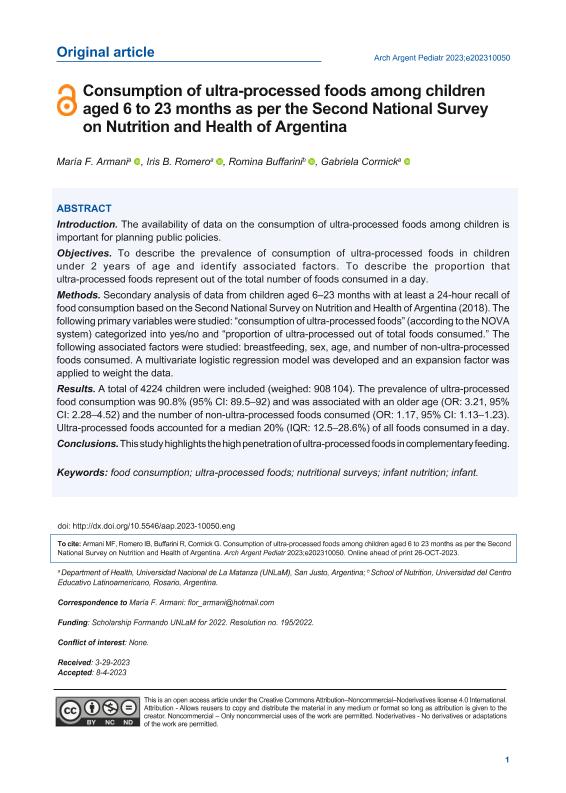Mostrar el registro sencillo del ítem
dc.contributor.author
Armani, María Florencia
dc.contributor.author
Romero, Iris Beatriz

dc.contributor.author
Buffarini, Romina

dc.contributor.author
Cormick, Gabriela

dc.date.available
2024-02-28T15:08:25Z
dc.date.issued
2023-10
dc.identifier.citation
Armani, María Florencia; Romero, Iris Beatriz; Buffarini, Romina; Cormick, Gabriela; Consumption of ultra-processed foods among children aged 6 to 23 months as per the Second National Survey on Nutrition and Health of Argentina; Sociedad Argentina de Pediatría; Archivos Argentinos de Pediatría; 122; 2; 10-2023; 1-7
dc.identifier.issn
0325-0075
dc.identifier.uri
http://hdl.handle.net/11336/228823
dc.description.abstract
Introduction. The availability of data on the consumption of ultra-processed foods among children is important for planning public policies. Objectives. To describe the prevalence of consumption of ultra-processed foods in children under 2 years of age and identify associated factors. To describe the proportion that ultra-processed foods represent out of the total number of foods consumed in a day. Methods. Secondary analysis of data from children aged 6-23 months with at least a 24-hour recall of food consumption based on the Second National Survey on Nutrition and Health of Argentina (2018). The following primary variables were studied: "consumption of ultra-processed foods" (according to the NOVA system) categorized into yes/no and "proportion of ultra-processed out of total foods consumed." The following associated factors were studied: breastfeeding, sex, age, and number of non-ultra-processed foods consumed. A multivariate logistic regression model was developed and an expansion factor was applied to weight the data. Results. A total of 4224 children were included (weighed: 908 104). The prevalence of ultra-processed food consumption was 90.8% (95% CI: 89.5-92) and was associated with an older age (OR: 3.21, 95% CI: 2.28-4.52) and the number of non-ultra-processed foods consumed (OR: 1.17, 95% CI: 1.13-1.23). Ultra-processed foods accounted for a median 20% (IQR: 12.5-28.6%) of all foods consumed in a day. Conclusions. This study highlights the high penetration of ultra-processed foods in complementary feeding.
dc.format
application/pdf
dc.language.iso
eng
dc.publisher
Sociedad Argentina de Pediatría

dc.rights
info:eu-repo/semantics/openAccess
dc.rights.uri
https://creativecommons.org/licenses/by-nc-nd/2.5/ar/
dc.subject
FOOD CONSUMPTION
dc.subject
INFANT
dc.subject
INFANT NUTRITION
dc.subject
NUTRITIONAL SURVEYS
dc.subject
ULTRA-PROCESSED FOODS
dc.subject.classification
Nutrición, Dietética

dc.subject.classification
Ciencias de la Salud

dc.subject.classification
CIENCIAS MÉDICAS Y DE LA SALUD

dc.title
Consumption of ultra-processed foods among children aged 6 to 23 months as per the Second National Survey on Nutrition and Health of Argentina
dc.title
Consumo de alimentos ultraprocesados en niños entre 6 y 23 meses según la Segunda Encuesta Nacional de Nutrición y Salud de Argentina
dc.type
info:eu-repo/semantics/article
dc.type
info:ar-repo/semantics/artículo
dc.type
info:eu-repo/semantics/publishedVersion
dc.date.updated
2024-02-28T09:52:20Z
dc.identifier.eissn
1668-3501
dc.journal.volume
122
dc.journal.number
2
dc.journal.pagination
1-7
dc.journal.pais
Argentina

dc.journal.ciudad
Ciudad Autónoma de Buenos Aires
dc.description.fil
Fil: Armani, María Florencia. Universidad Nacional de La Matanza; Argentina
dc.description.fil
Fil: Romero, Iris Beatriz. Universidad Nacional de La Matanza; Argentina
dc.description.fil
Fil: Buffarini, Romina. Universidad del Centro Educativo Latinoamericano; Argentina
dc.description.fil
Fil: Cormick, Gabriela. Consejo Nacional de Investigaciones Científicas y Técnicas. Oficina de Coordinación Administrativa Parque Centenario. Centro de Investigaciones en Epidemiología y Salud Pública. Instituto de Efectividad Clínica y Sanitaria. Centro de Investigaciones en Epidemiología y Salud Pública; Argentina. Universidad Nacional de La Matanza; Argentina
dc.journal.title
Archivos Argentinos de Pediatría

dc.relation.alternativeid
info:eu-repo/semantics/altIdentifier/url/https://www.sap.org.ar/docs/publicaciones/archivosarg/2024/v122n2a12e.pdf
dc.relation.alternativeid
info:eu-repo/semantics/altIdentifier/doi/http://dx.doi.org/10.5546/aap.2023-10050.eng
Archivos asociados
